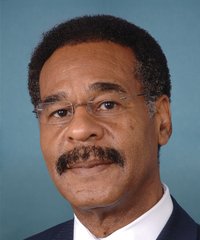
Emanuel Cleaver, II is now serving his ninth term representing Missouri's Fifth Congressional District, the home district of President Harry Truman. He is a member of the House Committee on Financial Services; Chair of the Subcommittee on Housing, Community Development, and Insurance; member of Subcommittee on Investor Protection, Entrepreneurship, and Capital Markets; member of Subcommittee on Oversight and Investigations; member of the House Committee on Homeland Security; member of the Subcommittee on Border Security, Facilitation, and Operations; and member of the Select Committee on the Modernization of Congress.
Having served for twelve years on the city council of Missouri's largest municipality, Kansas City, Cleaver was elected as the city's first African American Mayor in 1991.
There is no question that our educational system faces significant challenges that we must address in a comprehensive fashion, and to do so we must be willing to invest in public education. Unfortunately, schools and districts across the nation are struggling due to cuts made in the Budget Control Act, known as “sequestration.”
We must foster a collaborative relationship between local education agencies, states, and the federal government. States agree to implement federal law with the understanding that the federal government will provide a share of the funding. When Congress and the administration fail to fund programs adequately, we may harm that relationship and limit the potential for success.
Most in Congress agree that aspects of “No Child Left Behind” were problematic for schools and districts; we should be properly supporting our schools, promoting local control, and ensuring success for all students. However, I believe we can make these changes without draconian cuts to our children’s future. As we work to rebuild our economy, there can be no greater investment than in our children. Hardworking families throughout Missouri’s Fifth District deserve better. Halfhearted action from Congress puts the American Dream out of reach for millions of students, undermining our economy and weakening our middle class. A reauthorization of ESEA is long overdue; Congress must put aside its partisan bickering and pass a comprehensive bill.
It is my hope that we can continue to make progress in education, so that states are able to devote sufficient resources to train teachers, meet the academic needs of students with diverse learning requirements, implement better assessments that truly measure student performance, help struggling schools, and work to narrow the achievement gap to ensure that every student has equal opportunity to succeed. Not only is education an investment in the future of our children and our country, it generates the knowledge and innovation that will spark future economic growth and prepares our citizenry to participate in our democracy and compete globally.